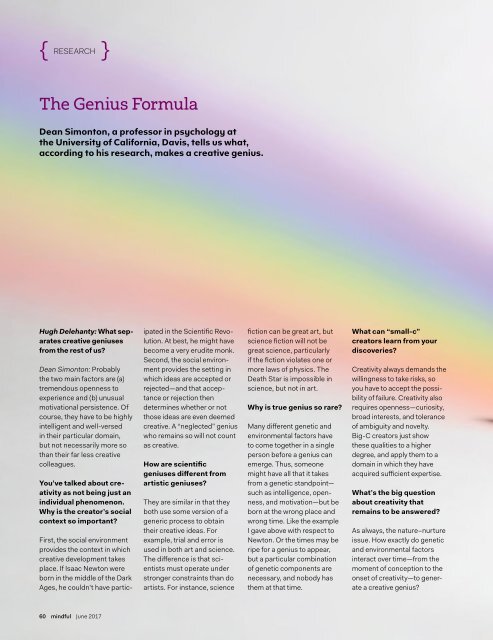Mindful June 2017
You also want an ePaper? Increase the reach of your titles
YUMPU automatically turns print PDFs into web optimized ePapers that Google loves.
RESEARCH<br />
{ }<br />
The Genius Formula<br />
Dean Simonton, a professor in psychology at<br />
the University of California, Davis, tells us what,<br />
according to his research, makes a creative genius.<br />
Hugh Delehanty: What separates<br />
creative geniuses<br />
from the rest of us?<br />
Dean Simonton: Probably<br />
the two main factors are (a)<br />
tremendous openness to<br />
experience and (b) unusual<br />
motivational persistence. Of<br />
course, they have to be highly<br />
intelligent and well-versed<br />
in their particular domain,<br />
but not necessarily more so<br />
than their far less creative<br />
colleagues.<br />
You’ve talked about creativity<br />
as not being just an<br />
individual phenomenon.<br />
Why is the creator’s social<br />
context so important?<br />
ipated in the Scientific Revolution.<br />
At best, he might have<br />
become a very erudite monk.<br />
Second, the social environment<br />
provides the setting in<br />
which ideas are accepted or<br />
rejected—and that acceptance<br />
or rejection then<br />
determines whether or not<br />
those ideas are even deemed<br />
creative. A “neglected” genius<br />
who remains so will not count<br />
as creative.<br />
How are scientific<br />
geniuses different from<br />
artistic geniuses?<br />
They are similar in that they<br />
both use some version of a<br />
generic process to obtain<br />
their creative ideas. For<br />
example, trial and error is<br />
used in both art and science.<br />
The difference is that scientists<br />
must operate under<br />
stronger constraints than do<br />
artists. For instance, science<br />
First, the social environment<br />
provides the context in which<br />
creative development takes<br />
place. If Isaac Newton were<br />
born in the middle of the Dark<br />
Ages, he couldn’t have particfiction<br />
can be great art, but<br />
science fiction will not be<br />
great science, particularly<br />
if the fiction violates one or<br />
more laws of physics. The<br />
Death Star is impossible in<br />
science, but not in art.<br />
Why is true genius so rare?<br />
Many different genetic and<br />
environmental factors have<br />
to come together in a single<br />
person before a genius can<br />
emerge. Thus, someone<br />
might have all that it takes<br />
from a genetic standpoint—<br />
such as intelligence, openness,<br />
and motivation—but be<br />
born at the wrong place and<br />
wrong time. Like the example<br />
I gave above with respect to<br />
Newton. Or the times may be<br />
ripe for a genius to appear,<br />
but a particular combination<br />
of genetic components are<br />
necessary, and nobody has<br />
them at that time.<br />
What can “small-c”<br />
creators learn from your<br />
discoveries?<br />
Creativity always demands the<br />
willingness to take risks, so<br />
you have to accept the possibility<br />
of failure. Creativity also<br />
requires openness—curiosity,<br />
broad interests, and tolerance<br />
of ambiguity and novelty.<br />
Big-C creators just show<br />
these qualities to a higher<br />
degree, and apply them to a<br />
domain in which they have<br />
acquired sufficient expertise.<br />
What’s the big question<br />
about creativity that<br />
remains to be answered?<br />
As always, the nature–nurture<br />
issue. How exactly do genetic<br />
and environmental factors<br />
interact over time—from the<br />
moment of conception to the<br />
onset of creativity—to generate<br />
a creative genius?<br />
60 mindful <strong>June</strong> <strong>2017</strong>


